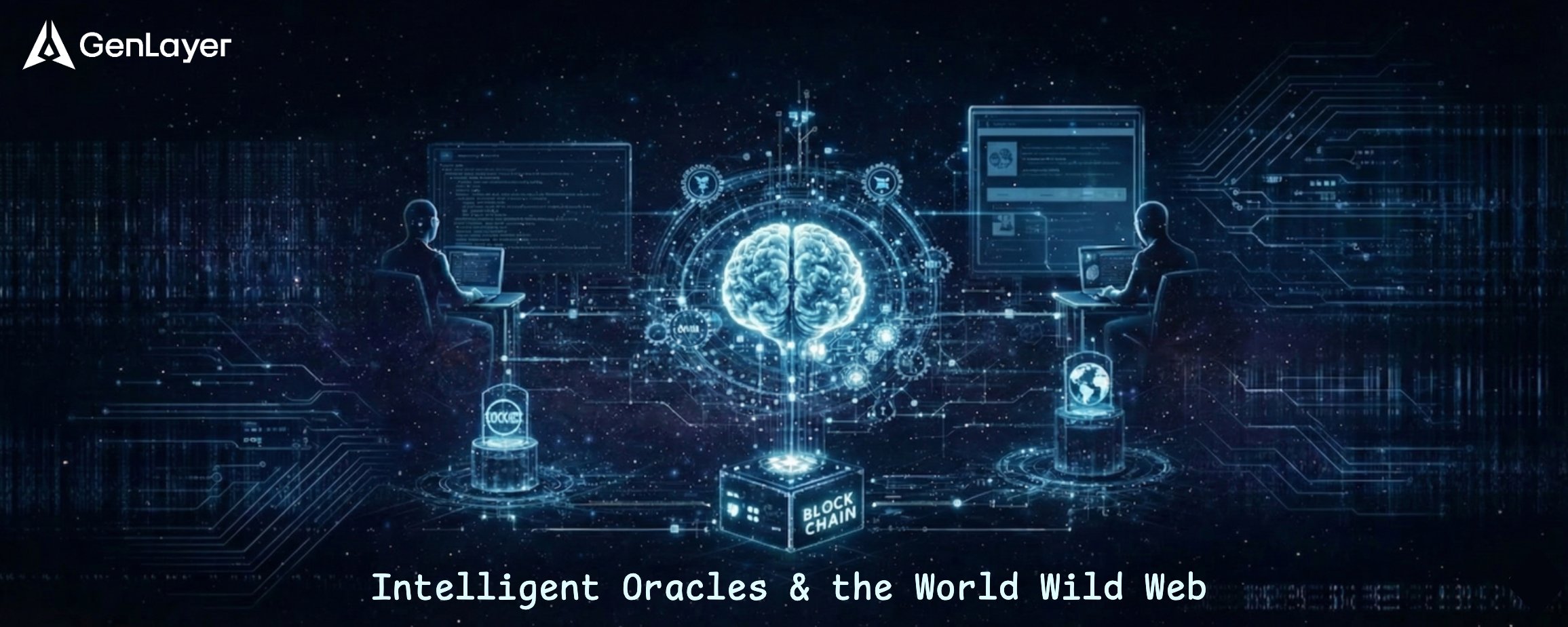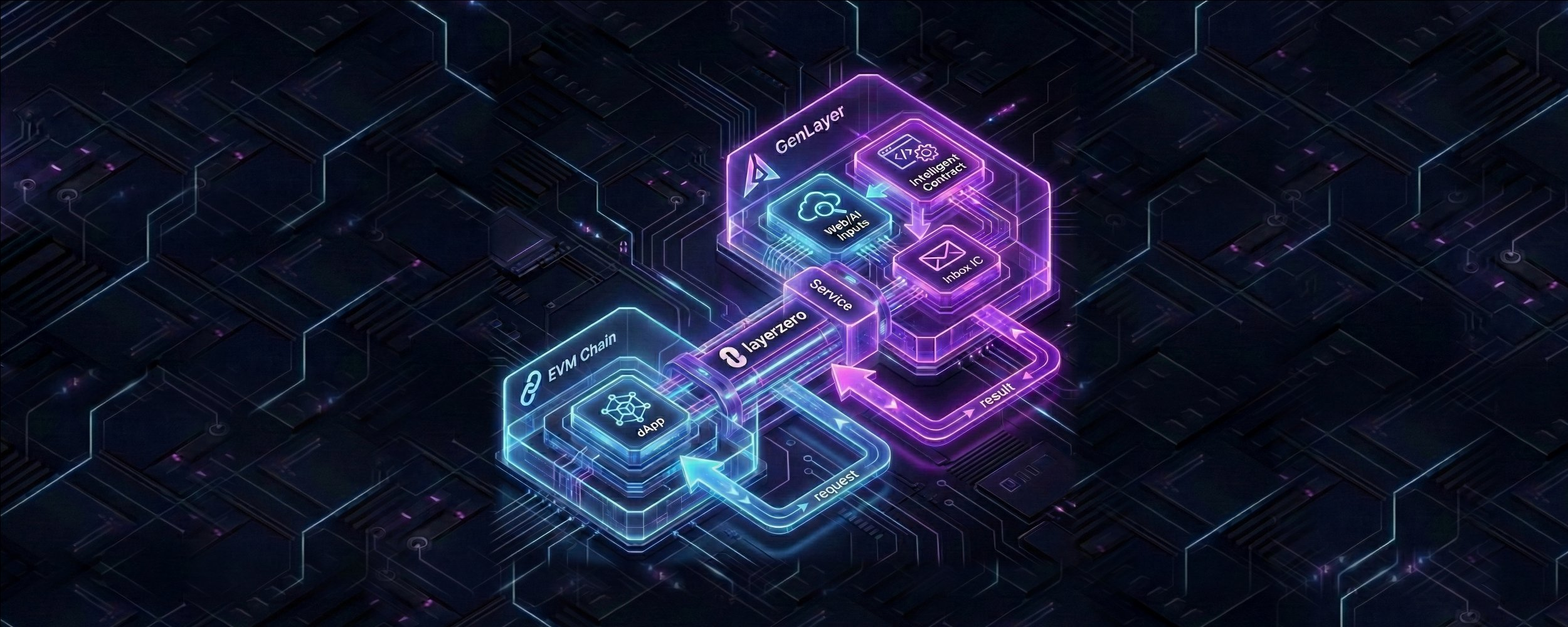Table of Contents

3 Use Cases That Will Disrupt Decentralized Applications
Wouldn’t it be amazing to live in a world where blockchains can do so much more than they currently can? A world where Web3 apps are not falling short to centralized, so called “Web2 apps”, only because they live on a decentralized ledger? A world where the core of blockchains, smart contracts, are by nature capable of executing transaction based on real-time decisions from the Internet?
The first Intelligent Blockchain GenLayer is trying to breathe new live into smart contracts by powering them with AI. Aiming for a new platform that will revolutionize how we interact with decentralized technology. In this article we will explore three use cases that could be built on GenLayer.
You want to know more about GenLayer’s basics? Then read this blog post first!
Prediction Markets: Facing Disruption
Have you ever bet on a prediction market, such as Gnosis or Polymarket, and put your money on the Ethereum ETF that is being approved by May 31? That’s only one potential form of a prediction market. By allowing individuals to place bets on the outcome of future events, these markets have all the data on the likelihood of various outcomes.
Do you want to bet on whether or not OpenAI will announce that it achieved AGI in 2024? Also, a case of a prediction market!

Traditional decentralized prediction markets have been slow and restricted because they rely on either people or oracles. An Oracle is a third-party software that enables Smart Contracts to receive data from outside the blockchain. This reliance makes Smart Contracts inflexible.
What market are we looking at?
How popular online gambling and betting have become worldwide is easily shown in numbers: The market was worth around $35 billion in 2022 and is expected to reach $67 billion by 2028. The largest decentralized prediction market, Polymarket, recorded a monthly volume of $450 million in September 2024, showcasing the immense potential for disruption in this space.
Most oracles cannot answer complex questions as they are not designed to fetch and process data from the internet. GenLayer’s Intelligent Contracts, on the other hand, can directly search the web for relevant information, gathering almost real-time data from the Internet and enabling them to handle a much broader range of prediction market scenarios.
Also, GenLayer’s consensus mechanism connects multiple validators to LLMs that verify data from the Internet and agree on the validity of the fetched information. As a result, the system is way more accurate and reliable, perfectly suited for contracts that safely keep customers’ funds.
Let’s assume you want to participate in a bet on who is going to win the 2024 presidential election. By entering a decentralized Application (dApp) built on GenLayer, you can easily search for the bet, choose your desired outcome, connect your wallet, and transfer the desired amount. Behind the scenes, GenLayer’s Intelligent Contract scraps the web for information on the election winner. Once the official result is determined, the contracts verify the outcome using various reputable sources and automatically distribute the rewards to those who placed the correct bet.
This process not only streamlines prediction markets but also ensures a fair and accurate result by leveraging the network’s collective intelligence and eliminating the need for potentially biased centralized oracles.
Parametric Insurance: Revolutionizing Risk Management with Automated Payouts
Parametric insurance is a type of coverage that pays out based on the occurrence of a specific event, rather than the extent of the damage caused. This makes it particularly useful for managing risks that are difficult to assess, such as natural disasters or pandemics.

What market are we looking at?
In 2022, storms alone caused over $130 billion in damages worldwide, with Hurricane Ian accounting for $100 billion in economic losses in the United States. Floods were the second costliest natural disaster, causing $45 billion in damages. While natural disasters are rising, the global insurance industry saw total premium income reach more than $ 5.6 trillion in 2022, with the property and casualty segment experiencing robust growth of 8.7%.
GenLayer’s Intelligent Contracts have the potential to revolutionize parametric insurance by automating the payout process and eliminating the need for human intervention. Imagine a parametric insurance policy that covers hurricane damage. The Intelligent Contracts can monitor weather data from various web sources, news sites, and (if accessible) satellite data. If the data indicates a hurricane has occurred in the insurance-covered area, the contracts can automatically trigger a payout to the policyholder.
This automated process provides a seamless experience for the policyholder, who simply needs to purchase the policy and wait for the payout to be triggered by the specified event. By leveraging GenLayer’s Intelligent Contracts, parametric insurance can offer a much-needed lifeline for individuals and businesses in areas with high risk of natural disasters.
How do Intelligent Contracts actually work?
Unstoppable Organizations: Empowering DAOs with AI-Driven Decision-Making
Decentralized Autonomous Organizations (DAOs) have emerged as the future of organizational structure, with decision-making power distributed among token holders or members. However, traditional DAOs have been limited by their inability to interact with the outside world and make decisions based on real-world events.

What market are we looking at?
As of April 2024, DAO treasury assets are estimated to be $38.4 billion, with $31.9 billion in liquid assets and $6.4 billion in vesting assets. The top five DAOs by treasury size include Optimism, Arbitrum, Uniswap, Mantle DAO, and Gnosis. Community engagement has also grown, with 10.1 million governance token holders and 3.1 million active voters or proposal makers.
GenLayer’s Intelligent Contracts enable the creation of AI-powered DAOs, organizations that can make decisions based on real-world data and events. These AI DAOs can have a constitution — predefined goals and values — guiding their decision-making process. By leveraging GenLayer’s Intelligent Contracts, AI DAOs can gather information from various web sources, analyze the data, and make decisions based on their findings.
For example, an AI DAO Fund created to invest in renewable energy projects can use GenLayer’s Intelligent Contracts to monitor news and market data related to the sector. The contracts can analyze trends, identify promising investment opportunities, and execute trades based on the AI’s analysis, with minimal or no human supervision. In the case of Uniswap, one of the largest DAOs, an Intelligent Contract could help streamline the proposal process by summarizing duplicate or fragmented proposals and creating a ranking system based on member popularity before voting occurs.

By enabling AI-powered decision-making, GenLayer’s Intelligent Contracts have the potential to revolutionize the way organizations operate, facilitating faster, more informed decisions based on real-time data analysis while promoting transparency and reducing bias.
Conclusion
The potential applications of GenLayer’s Intelligent Contracts are vast, spanning prediction markets, parametric insurance, AI-powered DAOs, and beyond. By combining the power of artificial intelligence with the security and transparency of blockchain technology, GenLayer is leading a new path for decentralized applications.
Are you ready to dive into the future of decentralized applications empowered by AI? Whether you’re a developer eager to build on the cutting edge, an investor looking for the next big thing, or simply curious about the convergence of blockchain and AI, GenLayer is your platform.
Join us on our mission!
Website | Blog | Discord | X (prev. Twitter) | Telegram | Simulator | Docs | Whitepaper
Related articles
.png)
Announcing Testnet Bradbury
Explore Testnet Bradbury: GenLayer’s "scholar’s gym" where AI meets blockchain consensus. Learn about greyboxing, model routing, and the road to Mainnet.

Intelligent Oracles & the World Wild Web
Stop building "blind" contracts. GenLayer Intelligent Oracles give dApps a brain to read, see, and reason with web data in a trustless environment.











